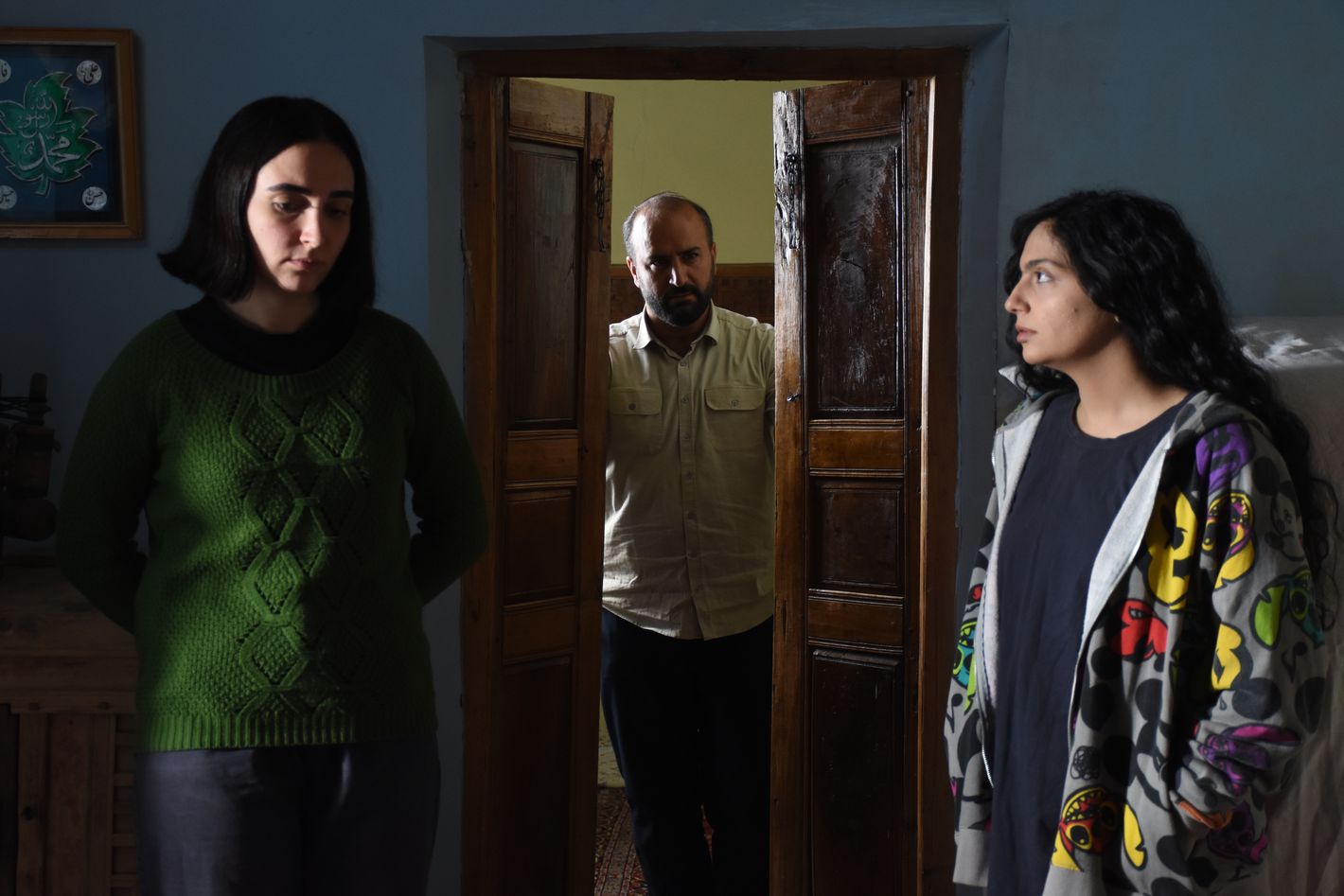
Midway through The Seed of the Sacred Fig, Islamic Revolutionary Court investigating judge Iman (Missagh Zareh), whose name means “faith,” is losing his grip. The gun he was responsible for as part of his job has disappeared, and his family claims they don’t know where it’s gone. He’s overwhelmed by all the Woman, Life, Freedom protestors coming through his court, and the many death sentences he’s been forced to sign. And the daughters he thought he had raised piously are shocking him with their sympathy for those women taking off their government-mandated headscarves and marching in the street. The boundaries he’s built between his personal and professional lives are collapsing, so much so that when he stops at a red light on the drive home, he thinks he sees his eldest daughter driving a car next to him, with her hair out, makeup on, and visible tattoos. She stares right at him, an unapologetic figment of his fears. The Seed of the Sacred Fig is a political thriller, a horror movie, and an ode to that unrepentance. The boldness of Iranian girls and women is its inspiration and its essence.
The Seed of the Sacred Fig was shot in secret in Iran and finished in Germany, where director Mohammad Rasoulof fled to avoid more prison time for his regime-criticizing films. (Rasoulof has been imprisoned twice, for charges including filming without a permit and “propaganda against the system.”) It’s set in Tehran in fall 2022, when protests broke out after 22-year-old Jina Mahsa Amini died while in the custody of the country’s religious police. Allegedly, Amini was arrested for not wearing the hijab correctly and, allegedly, she had a heart attack at the police station. For the thousands of people who flooded the streets chanting “Zan, Zendegi, Azadi,” the Persian words for “Woman, Life, Freedom,” and who know how viciously the government can punish women for being perceived as immoral, that story didn’t fly. The nearly three-hour-long, exquisitely tense The Seed of the Sacred Fig prioritizes the perspectives of the young women who led that movement, and who have since been further stifled for their participation in it. (Pockets of resistance remain, like this woman who recently undressed on a college campus as part of an anti-hijab protest.)
The film starts off as a domestic and workplace drama. Iman has recently been promoted to a judge within the Iranian court system that investigates crimes against the state, and the high-profile (and controversial) nature of the job means that his family will be moving to a bigger apartment in a more protected neighborhood. That change, says his wife Najmeh (played by Soheila Golestani, who in real life was jailed during the protests and remains unable to leave Iran), is the perfect opportunity to tell their two daughters, early-20s Rezvan (Mahsa Rostami) and teenage Sana (Setareh Maleki), what Iman does for a living, and to stress how the responsibilities of his new position affect them, too. They will need to be “irreproachable,” Najmeh says — no questionable selfies or social-media posts; no dyed hair, nail polish, or waxed eyebrows; and no friends who could reflect poorly on the family, like Sadaf (Niousha Akhshi), a college classmate of Rezvan’s whom Najmeh is convinced is a bad influence. As the protests break out and Sadaf gets caught up in them, the schism between the parents and their daughters grows.
“They have opinions, questions. They’re getting bored,” Najmeh warns Iman of their daughters, who have begun obsessively watching Instagram videos of the protests and scoffing at the state-run media’s description of the dissenters as thugs destroying property without cause. But Iman can’t imagine that his daughters would ever seriously break away from their parents’ opinions or act against their orders. Until the gun Iman was given by his employers for self-protection disappears. Then, all Iman can imagine is that his daughters are capable of anything, and The Seed of the Sacred Fig shifts into a reflection of Iman’s paranoia and a mimicry of the inquisition techniques he uses at work. He sends Najmeh, Rezvan, and Sana to a colleague who specializes in “psychology and body-language techniques” to judge whether they’re telling the truth about not knowing where the gun is. He upends their bedroom and searches through everything they own. He tries to turn them against each other, he confiscates their phones, and he’s shocked when their response isn’t acquiescence, but dissent.
In Rasoulof’s films, the effort it takes to stand up to the state is herculean, while following the law is an act of compartmentalization. In his last film, There Is No Evil, he probed at this difference in four vignettes about men responsible for enacting death sentences. Rasoulof has said that when he was in prison in 2022, the guards around him watched the film over and over again, and told him how much it lined up with their own experiences and feelings. The Seed of the Sacred Fig leaves less room for its viewers to feel for its male subjects, almost all of them government agents who do what they’re told, whether that’s emotionally tormenting young women or signing off on execution orders. Instead, it proposes that tradition and patriarchy are two intertwined poisons feeding off the youth and vigor of their subordinates (like the Ficus religiosa invasive weed the film is named after). Thanks partially to actual protest footage filmed by Woman, Life, Freedom participants, there’s a thoroughness to the way the film presents the perspectives of the young women living in the country: that cosmetics and visible hair don’t make your faith any less secure, that friendships between women aren’t dangerous, that people should be able to share their opinions about their rulers and their government without the threat of harm. It seethes in a way no celebrity statement or haircut-cutting video, well-intentioned as they may be, could match.
Rasoulof has talked about purposefully making his films less allegorical as his career has progressed, preferring to present his stories about oppression and totalitarianism plainly, so that his resentments are indisputable. Here, Rezvan and Sana frankly state their desire for independence (both young actresses are fantastic, but they especially shine in confrontations with their parents). When Rezvan points out to Iman at the dinner table that he’s never spoken to any of the dissenters he’s so judgmental toward, Rasoulof centers her in the frame and lets her state her case for treating women as human beings. When Iman turns his wife’s already politicized hair against her by dragging her down a hallway with it, Najmeh calls her husband a “brute,” unknowingly echoing what their daughter Sana called the cops attacking women. Those scenes are direct enough in ideology and presentation that you feel how the power dynamics on Iran’s streets and in this family’s home are in violent, roiling flux but are beginning to shift in favor of the repressed. By the time Rasoulof does indulge in some artistic flourish by zooming in on the bloody buckshot Najmeh spills down the family’s bathroom sink after giving first aid to a protestor, or shifting the POV to Sana’s eyes behind a blindfold in an interrogation cell, The Seed of the Sacred Fig has made the stakes clear enough that these moments aren’t distractions, but emotionally devastating complements.
The film still has a touch of the absurd, but it’s the despondent kind, like Iman’s office being decorated with cardboard cutouts of people like Revolutionary Guard commander Qasem Soleimani, assassinated by a U.S. drone strike in 2020, and littered with blindfolded prisoners in stress positions, standing silent as Iman and his colleague Ghaderi (Reza Akhlaghirad) walk around them. Neither turns to look at or acknowledge the prisoners and their plight. These men’s complacency, The Seed of the Sacred Fig argues, isn’t just a selfish act of self-preservation. It should be cause for their downfall.
More Movie Reviews
The boldness of Iranian girls and women is the inspiration and essence of Mohammad Rasoulof’s new film.

































































